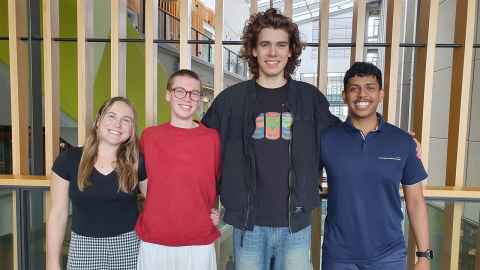Undergraduate Clinical Research Internships
Interested in clinical research? Want to work with internationally renowned Liggins Institute researchers?
2 years part-time internship

The Liggins Institute has established an undergraduate Clinical Research Internship programme for second year medical students interested in exploring research as part of their future clinical career.
Seminar: Ready for research? Four stories from undergraduate interns
Find out what clinical research is all about from four third year MBChB students currently interning at the Liggins Institute. This seminar is your chance to hear what they’ve discovered, find out what an internship involves, and get the details on how to apply.
This internship has allowed me to realise the integral role that research has within the world of clinical medicine. It has given me the immense privilege of working alongside a range of inspirational researchers and clinicians. The internship has taught me so many valuable skills so far, not only within research, but also within working with and learning from others.
What does an internship involve?
Interns undertake a two-year programme working within one or more clinical research projects at the Liggins Institute. Successful applicants are assigned supervisors and mentors and work alongside graduate students at the Liggins Institute. Interns are paid for casual work during the semester and full-time work during the summer breaks.
Interns are involved in completing, presenting and publishing a research project and gain invaluable research skills and experience. There is potential to undertake further formal research training (usually a PhD) at an appropriate stage in their future career and remain involved in future Liggins research.
Examples of possible projects include:
- Implementing guidelines for management of low blood glucose levels in newborns
- Causes, care and prevention of preterm birth
- MRI for early detection of developmental problems in moderate-late preterm babies
- Development of immune function in preterm babies
- Nutritional strategies to support very preterm babies
- Recruitment strategies for school-age follow-up studies
Application process
- Applications are invited from students in the second year of the Auckland medical programme.
- Applications should include a CV, including details of previous academic record before medical school if relevant, and a brief (<500 words) expression of interest.
- This should describe why the applicant is interested in this opportunity and how it might fit into their future plans. Medical school academic records will be made available directly to the selection panel.
- Applications close on Tuesday, 30th July and should be emailed to Anna Cable-Meunier: anna.cable@auckland.ac.nz
- Shortlisted applicants will be invited to an interview in mid-August.
- Four interns will be selected, based on academic record, commitment, and potential for a future research career. Priority will be given to applicants who do not have previous health or biomedical research experience.
About the Liggins Institute
The Liggins Institute was the University of Auckland’s first large scale research institute and is a world leader in perinatal medicine. The Institute is named after one of New Zealand's most eminent medical scientists, Sir Graham 'Mont' Liggins, who discovered in the late 1960s that corticosteroid treatment of mothers in premature labour would mature babies’ lungs sufficiently for them to survive after birth. This seminal discovery has become standard practice for premature delivery world-wide and has saved millions of babies.
Research at the Liggins Institute is built on this cornerstone discovery and Liggins researchers have demonstrated that events that occur before and during pregnancy can increase the risk of high blood pressure, obesity and type 2 diabetes in later life. Current studies within the perinatal research team involve clinical trials with mothers and babies and assessing both short- and long-term outcomes.
Questions?
Contact Professor Jane Harding: j.harding@auckland.ac.nz
2024 interns seminar
Watch the seminar below to learn more about the Liggins intern programme from Professor Jane Harding and four 2024 interns.